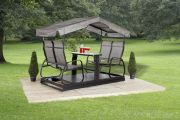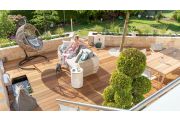PVC Decking and Composite Decking are two popular decking materials that offer homeowners a variety of benefits when installed. PVC decking is composed of 100% plastic, while composite decking is constructed of wood fibers and plastic particles. Both products offer unique advantages, such as low maintenance requirements and long-lasting durability, depending on the chosen product. Let’s explore further to discover which type of decking material is best for your outdoor project.
Similarities between PVC decking and composite decking
PVC decking is an excellent choice for outdoor decking applications due to its robust thermoplastic construction and lack of organic content. It requires practically no maintenance, resists weather damage more effectively than natural materials like wood and composite boards, and does not require sanding, staining, or sealing for extended longevity - all while providing a variety of colors and styles to match any home aesthetic.
Composite decking offers numerous advantages over traditional wood. It is composed of recycled plastics and wood fibers that are machined into boards; this makes it more resilient to warping, splitting, and decomposing than wooden materials like cedar or pine. Composite decks demand less upkeep than wood - they don't need sanding or staining - plus they come in a range of styles and colors, allowing you to tailor your outdoor area accordingly. This composite material is also resistant to rot, mold, and insect damage, making it even more practical for long-term use.
When looking at PVC and composite decking, both materials boast remarkable benefits, which make them ideal for constructing a new deck. Made up of a pre-determined percentage of plastic polymers, these materials provide durability, robustness, and the ability to withstand fading, staining, abrasion, and insect damage. Additionally, each material comes in an extensive range of shades and grain patterns so you can customize your outdoor area to your heart's desire. In summary, PVC and composite decking possess several similarities that make them ideal for installing a new deck, from their unbeatable strength and endurance to their easy-to-customize color palettes.
Comparing PVC Decking and Composite Decking
When it comes to choosing the right decking material for your outdoor space, PVC decking and composite decking are top contenders.
Composite is a more affordable option, but it’s not as durable as PVC. PVC, on the other hand, is more expensive than composite but offers greater resistance to the elements and wear and tear over time.
Why?
PVC decking is produced using Polyvinyl chloride - a plastic resin that has been utilized in various sectors for many decades. This composition makes it exceptionally resistant to corrosion from water exposure and, thus, does not warp or corrode like other materials. It is also incredibly lightweight, yet impressively sturdy and long-lasting, making PVC an excellent option for outdoor decking and cladding due to its capability to withstand moisture, temperature changes, and prolonged use. It provides superior protection from the elements than composite options, guaranteeing your decking or cladding remains attractive for years to come. Its complete reliance on manufactured plastic resin brings about a relatively high cost.
Due to its low-maintenance qualities and longevity, composite decking has seen an increase in popularity. Typically composed of a combination of recycled wood fibers and plastics like polyethylene and polypropylene, it offers a number of advantages. However, it does have some drawbacks, such as the organic content in the composite potentially being susceptible to mold or mildew. Additionally, the presence of wood fibers can cause the material to absorb moisture, making it vulnerable to warping and splitting over time. PVC decking is entirely comprised of plastic which prevents these issues - making it resilient to moisture, mildew, and warping, consequently giving it a much longer life span compared to composite decking.
The cost advantages of composite decking can be significant, yet its longevity won't match that of PVC decks. If it is well cared for, composite decking may last up to 20-25 years; but with minimal maintenance, the lifespan of PVC options can extend up to 50-year or even longer. Likely, the user will spend more time on upkeep with composite decking than those made from plastic, such as regular cleaning and sealing, in order to keep them looking their best. Nonetheless, a beautiful outdoor space is still achievable, with composite decking requiring less maintenance than other natural wood - though it may not maintain its strength and durability for as long.
Another notable distinction between PVC deck boards and composite boards is their surface temperature. Since most PVC board cores are produced with a foaming process, this decreases their material density and causes them to absorb far less heat than composite boards. This difference can be as much as 25% for various products.
This means that when composite boards are exposed to the hot sun, they will absorb the heat and become much warmer than PVC boards. This can be a huge benefit for anyone who frequently uses their deck in direct sunlight. It also makes a difference when it comes to barefoot comfort on a hot day. With a PVC deck, you don't have to worry about burning your feet or having to rush over them - they stay cooler even in the direct rays of the sun! But with composite boards, it's something you should consider before buying them if you plan on spending a lot of time out on the deck with no shoes.
Quick Summary:
| Upfront Cost Comparison: | Composite is better |
| Long-term daily usage cost comparison: | PVC is better |
| Lifespan Comparison: | PVC is better |
|
Surface Temperature Comparison: |
PVC is better |
When it comes to cost up front, composite is the way to go. But when looking at long-term use, PVC proves more economical and longer lasting. Not only that, but since it doesn't heat up as much under direct sunlight, it's a great choice for those who want to keep their outdoor living area comfortable. So whether you're looking for an economical and durable option or one that will keep your patio cool in the summertime, PVC offers a winning combination of benefits.


